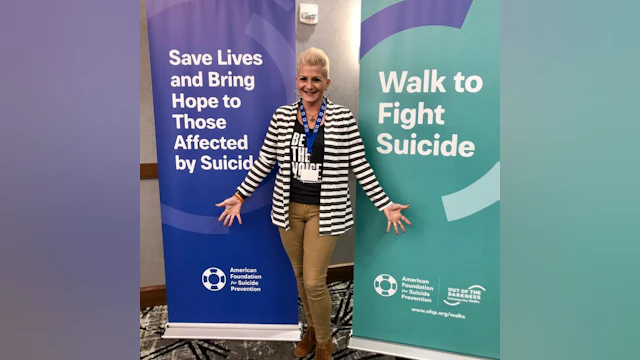A Program a Day in May: Bringing Suicide Prevention Efforts to Our Local Community
August 17, 2023 – 4 min read
By Lisa Matway, AFSP Board Chair, Michigan Chapter

Growing up in the 70s and 80s, I never had conversations about mental health or suicide prevention. People didn't talk about these things in my home or school environments. I had never even heard about a death by suicide in my community. So, it never occurred to me that suicide could affect my family — until it did.
I lost my brother Jim to suicide in 2010. He was 44 years old and had never been diagnosed with a mental health condition. Jim had the best, most sarcastic sense of humor, and an incredibly generous heart. I had no idea he was struggling. I quickly learned I had no tools in my toolbox to help me process his struggle, his death, and how to move forward.
About two years after Jim died, I began looking for ways to get involved with suicide prevention. I didn’t want anyone to experience what my family and I were experiencing, so I did some research and found the American Foundation for Suicide Prevention (AFSP). I started reading through AFSP's website and discovered the Out of the Darkness Community Walks. I attended my first walk at East China Township Park in the Fall of 2012 and have been walking ever since. The Walks have been an incredibly healing process for me as I've become more involved in the world of suicide prevention. Through the Walks, I finally found a place where I felt understood by others who could relate to me, my grief, and this journey.
After attending my first Out of the Darkness Community Walk, I also learned about AFSP's research efforts, advocacy work, and free suicide prevention education programs — an area near and dear to my heart. As a speech-language pathologist working in the public school system, I quickly learned that stigma surrounding suicide and mental illness is all too common. Educators are often uncomfortable approaching the subject of mental health and suicide prevention for fear that it could cause students to develop suicidal ideation. (I have since realized that scientific research shows this is not true!)
I wanted to learn how I could help reduce this stigma, so I attended AFSP’s standardized, flagship education program, Talk Saves Lives, as well as its program geared toward students and educators, More Than Sad. Through these programs, I’ve learned how to help save lives by recognizing the warning signs that someone may be suicidal, and practicing how to have open and honest conversations about mental health and suicide. What I learned through AFSP's programs has been foundational to my suicide prevention efforts, and I now know that educational programming is key to preventing this leading cause of death.
Since stepping into my role as board chair of AFSP’s Michigan Chapter, one of my main efforts has been continuing to ensure that our programming is accessible, and reaches as many people as possible in our communities. This year — at the suggestion of our area director, Anne Perry — the Michigan Chapter launched a new initiative called A Program a Day in May. Our goal was to reduce the stigma and myths surrounding mental health by educating our communities. We partnered with school districts, community organizations, and individuals seeking to become smarter about mental health and suicide prevention. Programs were offered virtually and also in person at various businesses, high schools, and the Detroit Police Department. We also hosted Zoom lunch-and-learns where we discussed who we are as an organization, the various programs we offer, and the many different ways to get involved with suicide prevention. Over the course of the month, we facilitated several AFSP programs, including Talk Saves Lives, More Than Sad, and Supporting Those At Risk. We also offered AFSP’s newer program, It’s Real: Teens and Mental Health, which is geared toward teens ages 14 to 18. The program raises awareness about mental health issues, how to start a conversation about mental health, the importance of self-care, and how to reach out for help.
The feedback we’ve received from school districts and students regarding this month-long initiative has been incredibly positive and impactful. Students expressed that they felt the programs helped them better understand how to have conversations with their peers about mental health, even when it might feel awkward. Educators also said that the programs helped them learn new, effective tools for how to talk with students and assist them with help-seeking.
We don’t always see or know the impact that we may have with our programming, but if we can reach even just one person through our education efforts, then we have succeeded. Knowledge is key, and AFSP’s suicide prevention programs strive to educate communities so that we may all become smarter about mental health. I’m so grateful to AFSP for the opportunity to add tools to my toolbox, and to increase my knowledge and understanding through these programming efforts. For you Jimmy, always.